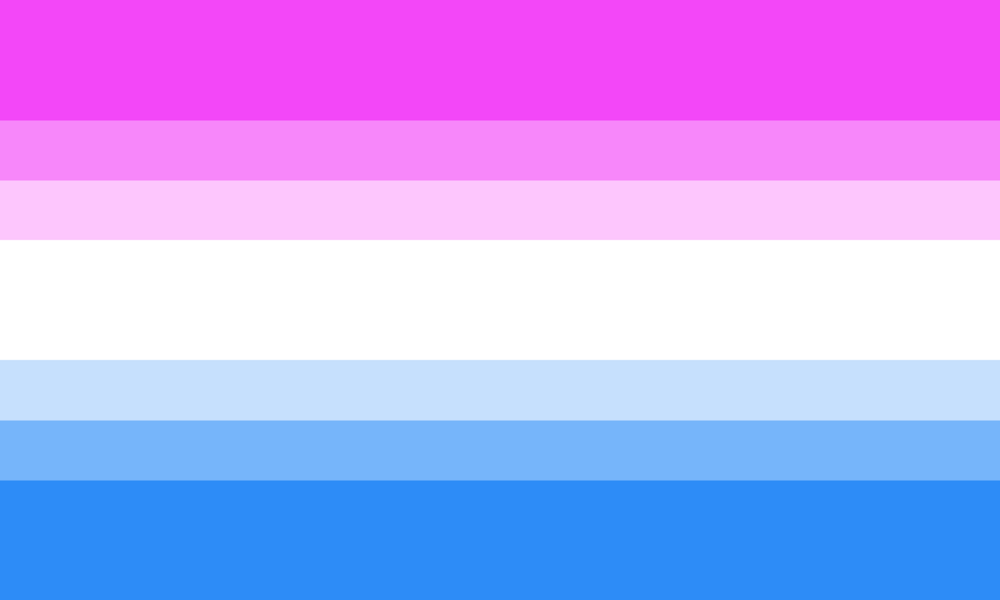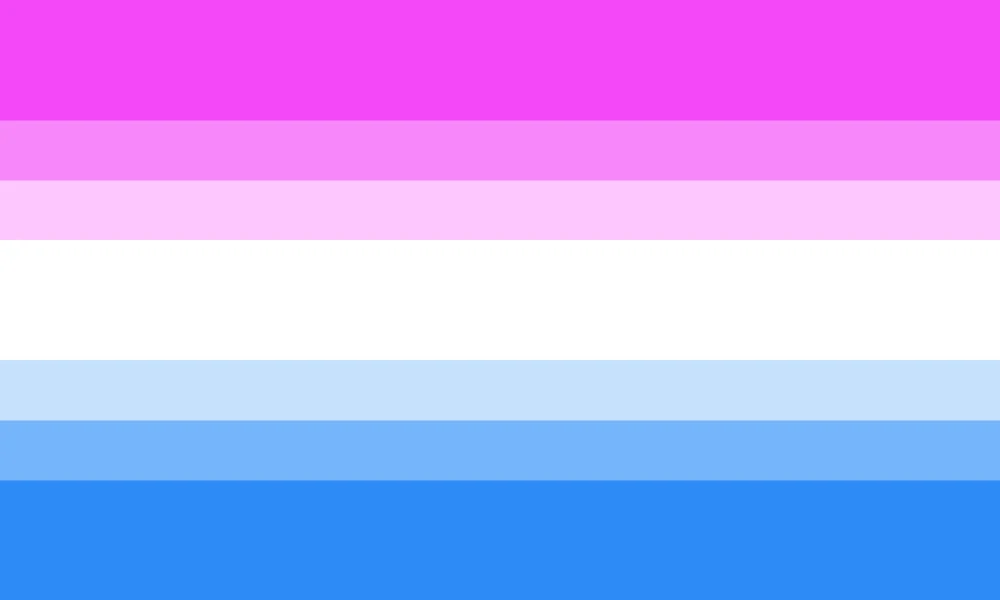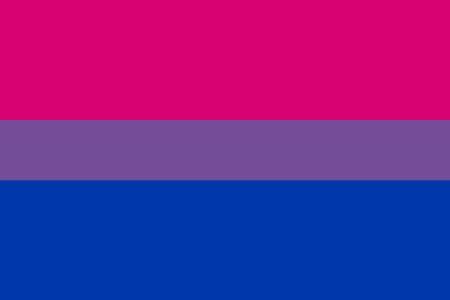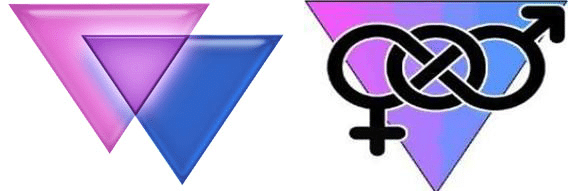Bi-Curious: Meaning, Usage, History and Symbols
 Bicurious flag
Bicurious flag
Terminology
The dictionary definition of bi-curious on Merriam Webster states that bi-curiosity is characterized by openness or curiosity about having sexual relations with a person who is of a different gender than one’s usual sexual partners.
The term bi-curious has a very similar definition to the term bisexual but should not be confused with it. The Lesbian, Gay, Bisexual, and Transgender Community Center states that being bi-curious can also be under the Q in the LGBTQ+ acronym. Q often stands for queer or questioning one’s gender and identity. The definition is not associated with sexual orientation and gender identity, but rather is more about attraction.
Someone who is questioning exploring their sexuality by engaging in relationships with folks of a different sex than their partner may identify with the term bi-curious. Sexuality terms may be confusing and most folks may choose to use other words or even the word queer which was a derogatory term that has been reclaimed by the LGBTQ+ community in recent years.
The actual definitions of the term bi-curious vary across the board. There is a general consensus that if someone is interested in exploring romantic or sexual relationships with more than one gender they may mean to be bi.
Bi-curious implies that a person who is dating a different gender wants to be with the same one as their own, or if they are dating the same gender then they are curious about a sexual experience with more than one gender. People who are interested in learning about their sexual identity often embrace the term prior to coming out.
Janet Brito, a certified sex therapist at the Hawaii Center for Sexual and Relationship Health says, “typically someone who previously identified as heterosexual or someone who is starting to explore or dabble in bisexuality would use this term,”
People of all genders may also use the term bi-curious to describe their identity. The term is often intended to be used by those who are curious about exploring or experimenting with their feelings.
The term does not mean that folks interested in exploring and engaging in relationships with people other than their gender have to engage in sexual activity. In fact, the definition suggests that anyone curious about exploring relationships, questioning attraction and feelings internally, thinking about their sexual identity may be considered bi-curious.
It is also potentially discriminatory because it implies the need for a sexual experience rather than attraction before claiming one’s sexuality as bisexual. Some people view it as a temporary identity.
History
There is no exact year that states when the term was first used. Merriam Webster dictionary lists 1984, the New Partridge Dictionary of Slang and Unconventional English says 1990, and the 1990s are listed as the date of origin in the Oxford Dictionaries’ Lexico.
There is no question the term’s use gained more ground with the increase of bisexual visibility in the United States in the mid-90s.
Bisexuality tends to have a bad reputation with some people considering it was a temporary identity. People who identify as bi-curious are often criticized for not being true to themselves by both communities.
Bi-curious people historically have been less open about their sexuality because of the lack of acceptance.
For example, a large 2017 study on Dutch people between the ages of 16 and 26 who were attracted to the same sex, found that some participants who identified as bi-curious or bisexual felt a pressure to ultimately choose between identifying as straight or gay. It also found participants who identify as bisexual or bi-curious are:
Flag and Symbols
The flag for bi-curious people was created in 2018 on Tumblr. There are several versions out there with the most prominent one featuring pink color representing gay people, blue for straight people, and white for everyone else questioning or being unsure about their sexuality.
 Bi-curious flag
Bi-curious flag
There is also a bisexual flag that features pink for gay people, blue for straight people, and purple for bisexuals that may sometimes be used by those who are bi-curious.
 Bi flag
Bi flag
Bisexual symbols like the pink, blue, and lavender triangles as well as interlocking biological symbols are also used to symbolize the attraction to both men and women.
 Bisexual symbols
Bisexual symbols
Pronouns
People of all genders who use different pronouns often identify as bi-curious. Typically they use gendered pronouns such as she/her and he/him but there are trans-bi-curious people who may prefer to use gender-neutral pronouns like they/them or xe/xem.
It is always best to state your pronouns first and ask the person what pronouns they prefer using.
Differences and Comparisons
Is Bi-Curious the same as:
Bisexual?
Bisexual people are attracted to both men and women. They make up more than half of the LGBTQ+ community. People who are bi-curious are still learning about their sexuality. That said, people who identify as bi-curious may eventually identify as bisexual. There are instances where bi-curious people enjoy relationships with only a specific gender and will prefer to identify as gay, lesbian, straight. Sometimes bi-curious people will eventually identify as pansexual or keep their sexuality at a bi-curious label.
Queer?
Even though many bi-curious people use queer as a synonym, the words are quite different. Typically queer is not the same as bi-curious. Queer means out of the box, unordinary, different from the norm. Think of being not cisgender, not heterosexual. For most queer people their sexual identity is also a political issue. Bi-curiosity is not political.
Heteroflexible?
You may hear the term as a similar word for bi-curious. It is similar, but heteroflexible refers to heterosexual people who are open to same-sex relationships. Bi-curious can refer to them as well, but most of the time it refers to either gay or straight folks who are entertaining the thought of opening the boundaries of their sexual and romantic relationships to other genders.
Am I Bi-Curious?
A person is bi-curious if they feel the word best describes the way they feel about their sexual orientation. If the word gives one a sense of comfort and makes them happy – then that is the terminology that works best for them at that point in their lifetime.
Yes, googling “what does it mean to be bi” is actually quite alright. It is a clear indication that you want to live your authentic life, explore your sexuality whether it is bisexuality or not time will tell and you will know the difference for yourself. There is absolutely no rush in terms of putting on a label on your identity. Sometimes finding the terminology that fits people can help them talk their issues out and make a huge difference in their life.
The term typically refers to those who are exploring attraction to people with either the same gender if they are heterosexual or different genders if they primarily identify as gay.
There is continued debate on who is and who is not, but you may be if:
- You contemplate or think about expanding the boundary of their sexual and romantic relationships with members of the opposite sex or same-sex depending on your sexual orientation
- You are questioning attraction internally
- You are considering identifying as bisexual, but are not yet comfortable with the label
- You want more flexibility in terms of putting a label on their sexuality
It is the perfect label for someone who is learning about what fits them best romantically and sexually.
If a person is from a heterosexual background then finding resources and LGBTQ+ organizations may be tremendously helpful. It is worth getting acquainted with queer culture, bisexuality, and history as a whole.
If a person is from a gay background then definitely learning about bisexual erasure in the community, connecting with bisexual organizations, finding out more about the history of bisexual people and the role they played in the LGBTQ+ rights movement will be tremendously helpful.
It can be quite daunting to talk to your friends and family about bisexuality. In fact, it may be detrimental to one’s health if they are in a hostile or non-accepting environment. Especially, for your people who need attention and support when it comes to their mental health.
Coming out as bi-curious may not go as intended, so no need to put added pressure on yourself if you do not feel safe or supported. There are a lot of organizations offering support to those thinking about addressing their sexuality, coming out, or simply talking about it.
A great way to talk about one’s sexuality, health conditions, concerns is by reaching out to LGBTQ+ health organizations that can help with locating health services available in your area. There are also youth helplines and queer spaces open to people who mean to be bi.
Can other terms fit better?
Absolutely! In fact, if you find that you identify better with the other terms under the bisexuality umbrella – that is great. Sexuality can evolve and no one can tell you whether to be the term bisexual or gay or straight. People can and do often change.
There are many stereotypes in the heterosexual and LGBTQ+ communities. Try to learn about them and not reinforce any. Being open to exploring and experimenting with bisexuality may be a wonderful new feeling for you, but some persons are extremely cautious of those who are more flexible.
Relationships with bisexual individuals are sometimes perceived as experiments. Some in the LGBTQ+ community frown upon those who use the term bi-curious to identify themselves. Heterosexual folks can dismiss being bi-curious altogether. So being aware of the nuances can spare you lots of time in searching for a term that fits well with your identity.
It is important to keep in mind that selecting a label that fits you well at a certain point in your life is up to you and you alone. If you feel that you are bi-curious, your sexuality is valid. It is not up for debate or question by others.
A bi-curious person is someone who is actively exploring their sexuality. You may want to be seen and heard right away by the LGBTQ+ community. You may also start out by doing some of the following:
- Register on online dating apps specifically made for LGBTQ+ people
- Join groups, go to clubs, bars
- Actually, hang out and go on dates with the gender they are curious about
- Connect with bisexual and queer community organizations and people to help you find out more
You may ultimately choose to identify as gay. Perhaps you will find bisexual more fitting, maybe bi-curious will stick around. Either way asking yourself questions, searching for answers is a great way to learn more about yourself.
People often identify their sexuality in different ways. Our identities mean different things to each and every one of us. Some can only think of having a sexual experience with the same or different sex in order to identify as certain sexuality. While others describe it as a more spiritual, internal feeling. Whatever label you see fit for yourself is actually the right label for you.
Mental Health
Bisexual people make up half of the LGBTQ+ community, but they are much more likely to suffer from mental health issues. According to a recent study published in the Journal of Bisexuality, bisexual and bi-curious women in relationships with heterosexual men are much less likely to come out.
This means that a woman is much less likely to talk to her cisgender heterosexual male partner about her identity. Researchers found that a bi-curious woman may experience issues with physical and mental health due to the fact that her sexuality is under wraps.
For example, a woman who is in a relationship with another woman may be less affected by her partner’s sexual orientation and gender. Peer-reviewed studies found that partners that both identified as bisexual had the least anxiety when it came to experiencing issues based on their sexual identity.
Relationships
A person may realize they are attracted to other or same genders at any moment during their lifetime. There are people who go through their whole lives thinking they need to only identify as gay or straight. To them, bisexuality is often just a phase, and bi-curiosity does not exist, so they get married without sharing their true authentic self. Then there are those that know t fairly early on in middle or high school.
Bi-curiosity can make a huge impact on a relationship. Talking with a partner about the attraction and thoughts openly may help. It is always best to find resources that help people who are bi-curious and in relationships.
It is absolutely fine to be attracted or think about attraction without ever acting on it. If a person is in love and attracted to their partner there is no need to break up with them because of your bi-curiosity. It is important to keep the communication lines open so the relationship is satisfying on emotional and physical levels.
Offering Help and Support
There is a lot of stigma associated with it. If you are wondering how to support people who are bi-curious, here are some of the ways to do that:
- Let them know that you are here for them
- Be an active listener
- Make sure to ask questions at the right time
- Find resources online that you can suggest to them
Bi-curiosity is not easy to explain. The LGBTQ+ community has more than half of bisexual people, but many of them struggle to come out because of the stigma and societal pressure to pick a side. There is even a whole month dedicated to bisexual health. Keep in mind that bi-curious people may be thinking of coming out as bisexual eventually, but that does not mean they are.
Sexual orientation and identity are deeply personal. So, coming out has to be done on their terms. You can be a supportive friend that is there for them. Learning about bisexual erasure and finding community organizations can also help someone who is bi-curious. Suggesting a therapist or a counselor may also be a great way to offer help and support.
